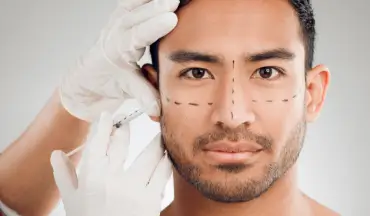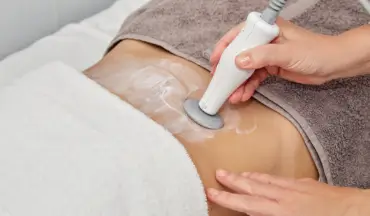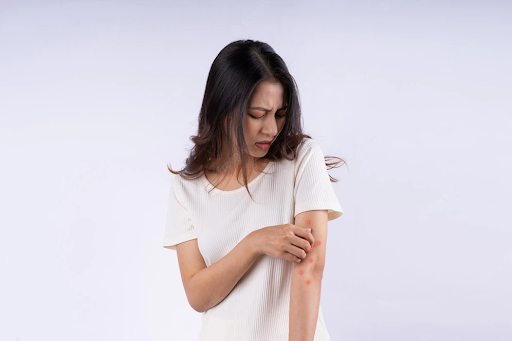What is Atopic Dermatitis?
Atopic dermatitis is a chronic skin disease characterised by inflammation, redness and irritation. Skin often appears red, dry, crusted, cracked and swollen.
The onset of atopic dermatitis can occur at any age but it often happens between the ages of 3 to 6 months old. It is common for individuals with atopic dermatitis to go through flares (when symptoms worsen) and remissions (when the skin gets better or clears up completely).
Signs & symptoms of atopic dermatitis
The most common symptom of atopic dermatitis is severe itchiness. Other common signs include:
-
Raw, sensitive skin resulted from severe scratching
-
Discoloured patches of skin
-
Dry, cracked skin
-
Rashes that bleed or ooze clear fluid when scratched
Types of dermatitis
A few examples of dermatitis are:
- Seborrheic dermatitis - mainly affects the scalp that causes dandruff, scaly patches and inflammation.
- Nummular dermatitis - also known as discoid eczema, mostly occurs on the forearms, hands and lower legs, and causes coin-shaped plaques of dermatitis.
- Dyshidrotic dermatitis (pompholyx) - primarily affects the hands or feet, and causes itchy blisters.
- Diaper dermatitis (rash) - common among infants, it is caused by moisture in the diaper area which promotes bacterial growth.
- Contact dermatitis - occurs when coming in contact with foreign substances such as chemicals in soap or water.
- Perioral/periorificial dermatitis - mainly affects the area around the mouth.
- Varicose dermatitis - common among people with varicose veins (swollen and enlarged veins) and primarily affects the lower legs.
What causes atopic dermatitis?
The causes of atopic dermatitis include genetics, environmental triggers and immune system issues. However, it is not contagious.
Several factors increase your likelihood of developing atopic dermatitis. These include:
-
A history of dermatitis, asthma or hay fever in the family
-
Excessively dry, itchy skin
-
Skin infections
Atopic dermatitis can be triggered from:
- tobacco smoke
- certain types of air pollutants
- heat and sweat
- rough fabric
- cold and dry air
- fragrances found in daily items such as skin products, detergents and soap
- chemicals and other irritants (e.g. fluoride found in toothpaste or water)
Diagnosis for atopic dermatitis
Your doctor will examine your skin to look for signs of atopic dermatitis such as scales, dry patches, rash and more.
The doctor may also ask about your family history on allergies, enquire about any previous treatment for skin-related symptoms and usage of medications such as steroids.
Blood testing may be done to look for potential causes that are unrelated to the dermatitis that the patient is experiencing. Doctors may also recommend patch testing to identify the allergies that are producing dermatitis.
Treatment for atopic dermatitis
Your doctor may propose a self-care routine if the symptoms are mild. Routines may include:
- Managing stress levels
- Eating a healthy diet
- Getting good rest
- Using an unscented, mild soap
- Having regular baths and moisturising routine for improving and protecting the skin barrier
Your dermatologist might suggest medicated creams that control itching and help repair skin. If your symptoms persist, the self-care routines can be combined with other treatments:
- Topical therapy which includes moisturiser, antiseptic/antimicrobial agents and anti-inflammatory agents
- Topical corticosteroids such as Triamcinolone acetonide 0.1% cream, Clobetasone butyrate 0.05% cream/ointment
- Topical calcineurin inhibitors such as pimecrolimus and tacrolimus
- Wet wrap therapy - The affected area is layered with moisturiser alone or in combination with topical corticosteroids. It is then covered with two layers of tube bandage (a wet inner layer and a dry outer layer).
- Phototherapy
- Systemic therapy includes specific treatment (immunomodulating agents and biologics) and adjunctive treatment (antihistamines)
Persistent outbreaks of atopic dermatitis are not uncommon. You might have to try out a few different therapies for several months or years to manage dermatitis. As a result, you should make regular visits to your doctor.
At SKINCENTRIC based in Bukit Tinggi Medical Centre (BTMC), our healthcare professionals will assist you in identifying the source of your skin problems, prescribing effective treatments and advising you on how to best care for your skin in the long term.








